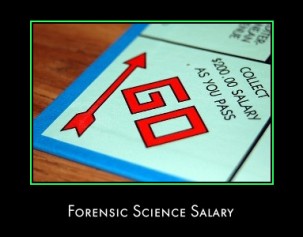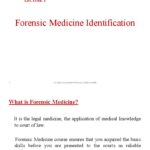The allure of forensic science, often stoked by captivating procedurals on screen, frequently draws aspiring minds to pursue advanced degrees. A Master of Science (MSc) in Forensic Science promises a deeper dive into the intricacies of crime scene analysis, laboratory techniques, and legal frameworks. However, a pivotal question looms large in the minds of prospective students: what pecuniary compensation can one expect after investing in this specialized education?
Addressing this inquiry requires a nuanced approach. While an MSc undoubtedly enhances one’s skillset and marketability, pinning down a precise salary figure proves elusive. Several factors interplay to determine the ultimate remuneration, painting a picture far more intricate than a simple numerical value.
The Labyrinth of Factors Influencing Earning Potential
1. Specialization: Carving a Niche in the Forensic Landscape
Forensic science is not a monolithic entity; it encompasses a spectrum of specializations, each commanding varying levels of expertise and subsequently, different salary brackets. A toxicologist, meticulously analyzing biological samples for the presence of illicit substances or poisons, may find their expertise in higher demand (and therefore, better compensated) than a general forensic scientist. Similarly, a digital forensic investigator, adept at unraveling digital breadcrumbs in cybercrimes, often commands a premium due to the escalating prevalence of technologically driven offenses. Consider the subdisciplines of DNA analysis, ballistics, forensic anthropology, and questioned document examination. Each requires a unique skill set, and the demand for specialists within each field heavily influences their respective salaries. The depth of knowledge and experience within your chosen forensic science specialty dictates your potential earning capacity.
2. Geographic Location: The Supply and Demand Equation
The principle of supply and demand exerts a significant influence on salary expectations. Metropolitan areas with higher crime rates or denser populations generally offer more opportunities for forensic scientists, potentially driving up salaries. Conversely, rural areas may present fewer openings and, consequently, lower compensation. Furthermore, the cost of living varies considerably across different regions, impacting the perceived value of a particular salary. A seemingly substantial salary in a low-cost area might not stretch as far in a bustling urban center.
3. Experience: The Crucible of Expertise
As in most professions, experience is a valuable commodity in forensic science. Entry-level positions, typically occupied by recent graduates, naturally command lower salaries than senior roles held by seasoned professionals with years of hands-on experience. The accumulation of practical knowledge, refined skills, and a proven track record of successful case resolutions significantly bolsters earning potential. Progressing from a forensic technician to a senior forensic scientist or a supervisory role involves acquiring expertise, demonstrating leadership, and contributing to the advancement of the field.
4. Employer Type: Navigating Public and Private Sectors
The type of organization employing a forensic scientist also plays a crucial role in salary determination. Government agencies, such as law enforcement departments and forensic laboratories, often adhere to standardized pay scales based on experience and education level. Private forensic consulting firms, on the other hand, may offer more competitive salaries to attract top talent and secure lucrative contracts. The trade-off, however, might involve longer hours, greater pressure, and a more demanding work environment. The choice between public service and private enterprise hinges on individual priorities and career aspirations.
5. Certifications and Professional Development: Upping the Ante
While an MSc provides a solid foundation, pursuing relevant certifications and engaging in continuous professional development can further enhance earning potential. Certifications from recognized forensic science organizations demonstrate a commitment to excellence, adherence to industry standards, and mastery of specific techniques. Actively participating in workshops, conferences, and training programs allows forensic scientists to stay abreast of the latest advancements in the field, expand their skill sets, and network with peers, all of which contribute to increased marketability and salary prospects.
Decoding the Salary Spectrum: A Range of Possibilities
Bearing in mind the aforementioned variables, it is possible to provide a generalized salary range for individuals with an MSc in Forensic Science. Entry-level positions may start around $50,000 to $60,000 annually, while experienced professionals with specialized skills and certifications can potentially earn upwards of $80,000 to $100,000 or more. These figures should be considered as broad estimates, subject to fluctuation based on the specific factors outlined above.
Ultimately, the pursuit of an MSc in Forensic Science is an investment in one’s future, but not solely in monetary terms. It cultivates critical thinking, hones analytical prowess, and fosters a deep understanding of the scientific principles underpinning the investigation of crime. While financial remuneration is a legitimate concern, the true rewards often lie in the intellectual stimulation, the sense of purpose, and the opportunity to contribute to the pursuit of justice. The intricacies of forensic science, the unraveling of mysteries, and the application of scientific rigor to legal proceedings are what truly captivate those drawn to this dynamic field.










Leave a Comment